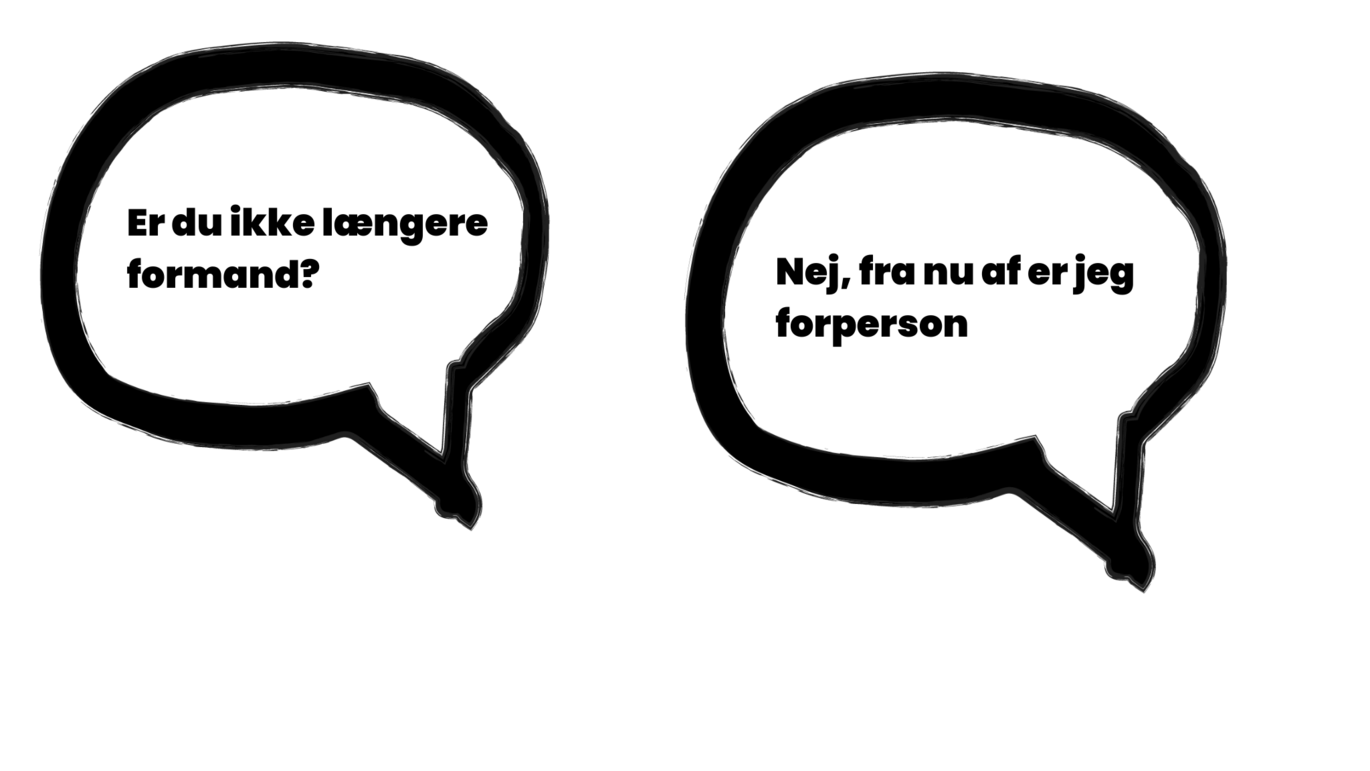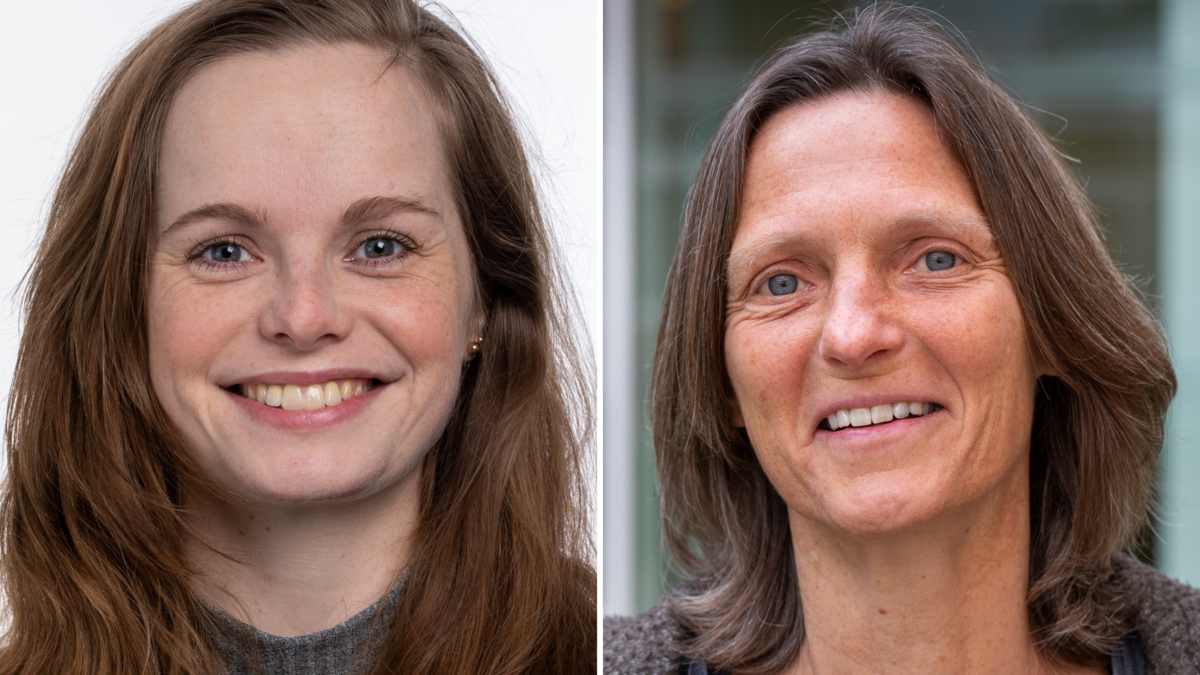Health has a new set of principles for gender-neutral language: Replace embedsmand with embedsperson
At the Faculty of Health, gendered terms such as formand, talsmand or mandskab are going to be a thing of the past. The faculty has introduced principles for gender-neutral language to increase gender equality, explains Dean Anne-Mette Hvas. The principles are not rules, but the dean hopes that they will become the new norm.

Since this article discusses guidelines that refer to the Danish language, we have kept all the examples of gendered and gender-neutral language in Danish.
At the Faculty of Health, it is important whether employees choose to use formand or forperson or talsmand or talsperson. The faculty has introduced a new set of principles for gender-neutral language to help administrative staff, researchers and students get used to weeding out gendered words, both when writing and speaking.
Health has prepared a list of gender-neutral alternatives to words that are described as gendered. The recommendation is that “whenever you encounter a gendered term, you should consider whether it supports a stereotype and whether there is a more neutral word”.
For example, Health recommends that you stop writing ‘male nurse’ and instead just use ‘nurse’, just as you should not refer to someone as a female doctor, just a doctor. Health also recommends replacing formand with forperson or tillidsmand with tillidsrepræsentant; a change that has become increasingly common in recent years. Some examples are less common, for example embedsmand can be changed to embedsperson, or mandsopdække can be replaced by overvåge. However, the principles from Health acknowledge that it can be challenging to find gender-neutral alternatives to words like ombudsman, vismand and tjenestemand.
Dean of Health Anne-Mette Hvas explains that the principles are intended to help increase inclusion because language affects how we see the world.
“I think this will help increase a sense of equality; a sense that everyone at the table is equal. Imagine it the other way around: From now on we’ll call everyone a chairwoman. You’d immediately be hit with "Uh, I'm not a woman though". As soon as you turn it on its head, you get a sense of what the issue is all about. We’ve just got used to the other version. These are historical terms that affect how we see the world. And we’d like to shift that towards a more contemporary view of the world," says Anne-Mette Hvas.
A suggestion, not a mandate
The faculty describe the gender-neutral language initiative as a guideline. But according to Anne-Mette Hvas, the initiative should perhaps be considered as a set of principles or a statement of intent.
"You can’t dictate a change in culture. But you can lay the path and show the way forward," she says.
You are not forced to follow the guidelines, emphasises the dean. And there are therefore no sanctions for using gendered language at the faculty.
“It’s important for me to make clear that we’re not going be language police. Nobody’s going to come after you for using a gendered term. But we want to send a clear signal that we believe it matters - and that's why we've created the guidelines. We want employees to be conscious of their language and to accept that being part of an inclusive workplace also means using gender-neutral language," she says.
The list of gender-neutral alternatives is not cast in stone, explains Anne-Mette Hvas. As an employee, you are not required to follow the list to the letter.
"It's meant as an eye-opener to demonstrate just how many gendered concepts there are - especially in position titles. But it's not just about chairman/chairperson. That’s a rather banal example and some might sigh and say, ‘What difference does that make?’. The list was developed to give people an aha experience: ‘Wow, that makes sense. Why don't we change that?’.”
The dean hopes that gender-neutral language will become so normalised that it will be odd if someone does not use it.
"It might become so common that people will be surprised if it is not used. Perhaps students will think: ‘Oh wow, haven’t we got any further than this?’ But things won’t change until someone takes the first step. And then more people will begin using it too, and at some point it’ll become natural. That's how I want to see the change happen," says Anne-Mette Hvas.
Hoping researchers will take it to heart
The dean is well aware that some people will find this change more difficult to come to terms with than others. She suspects that using gender-neutral language will come more naturally to students, and that it might be more of an adjustment for people who did not grow up with the concept. At first, the change will be most noticeable from an administrative side, as the administration works a lot with text and communication and will quickly implement the new guidelines. However, Anne-Mette Hvas hopes that researchers will follow suit:
"I hope that researchers will eventually embrace the new policy too. I know it’ll take time. And I acknowledge that language is very embedded in us. Some will feel that it sounds really artificial at first. But once you've done it a few times it’ll become more natural and you’ll forget there ever was a different way of saying things," she says.
But what about the fact that everyone has their own way of using language, and that some people might feel like they can’t quite take it all onboard?
“I know some people feel that way, and I fully understand. Still, I’d like to reiterate that language impacts how we see the world and how we see each other. That's my standpoint, and I feel privileged to say that I’d like to help promote a more nuanced view in the future. It means a lot to me as a manager to be part of setting direction. One of those directions is having an inclusive workplace and student life, and gender-neutral language is part of this. This is a direction I want to make very clear," says Anne-Mette Hvas, who also acknowledges that even she sometimes finds it challenging.
“I even experience it myself sometimes since I grew up using more gendered language. It can’t be changed from one day to the next. But just the fact that we're having a conversation means something. The world is shifting. In many areas, we need to do things differently than before. When I was growing up, babies just slept on the backseat, where there weren’t any seatbelts, and my dad smoked in the car. Today, that would be completely unthinkable. I think it's the same with language. So much has changed in the way we think about things, including gender, and language needs to catch up," says Anne-Mette Hvas.
Anne-Mette Hvas acknowledges that some of the words from the list of gender-neutral alternatives are more straightforward than others. For example, many people will have to get used to using the word embedsperson, which you can’t look up in a dictionary.
"I agree that some of the examples can feel a bit too artificial or principled. I’m pretty laid back about it. The important thing for me is that we actively work with language and that we change the words we use a lot," she says.
Union representative: Everyone I talk to feels positive about it
Doctor and PhD student at AU Christine Cramer is the joint union representative for members of the Danish Association of Junior Hospital Doctors at Health and the union representative for members of the Danish Association of Junior Hospital Doctors at the Department of Public Health, and she says that her colleagues feel positive about the new principles.
"All the colleagues I've spoken to about the initiative welcome it and everyone thinks it's important to put equality and inclusivity on the agenda. I come from a union that made the decision to introduce gender-neutral titles back in 2022, so an initiative like this isn’t completely new to me or my colleagues. Many of my colleagues have already begun to use many of the words and suggestions mentioned in the principles," says Christine Cramer.
(copy 83)

(copy 84)
The initiative cannot stand alone
However, she also says that other doctors consider the initiative a small first step that, according to them, should lead to bigger leaps towards an inclusive workplace.
"People say that it's great to focus on language, but that there are many other important issues when it comes to creating an inclusive workplace: Working conditions, pay and equal opportunities. It's a fine initiative, but it can't stand alone. Efforts to change our language aren’t enough to create an inclusive workplace."
In relation to AU's overall action plan for equality, diversity and inclusion, as well as Health's own efforts in this area, Anne-Mette Hvas acknowledges that there are many other important initiatives but she believes that the importance of language should not be underestimated.
"Yes, it may seem like a small step, but it's important because language has a big impact on how we perceive each other. It's a relatively far-reaching initiative in the sense that it can be difficult for individuals to change because language is so strongly embedded in each of us. But it's really important to me that we use language that shows we view each other as equals," says Anne-Mette Hvas.
Medicine is based on biological sex
Christine Cramer draws attention to the fact that at a faculty of health sciences, there will continue to be situations where gendered terms have their place because medicine is largely based on biological sex.
"But it of course it makes sense not to gender our language unnecessarily and to be mindful of gendered terms so that everyone feels comfortable in the workplace," says Christine Cramer.

